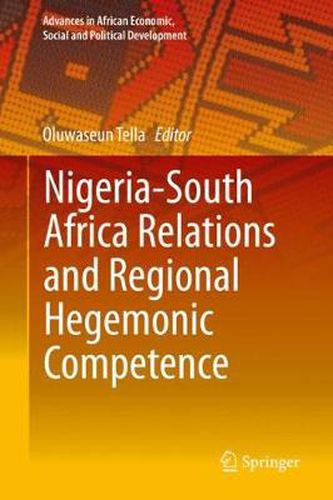Readings Newsletter
Become a Readings Member to make your shopping experience even easier.
Sign in or sign up for free!
You’re not far away from qualifying for FREE standard shipping within Australia
You’ve qualified for FREE standard shipping within Australia
The cart is loading…






This title is printed to order. This book may have been self-published. If so, we cannot guarantee the quality of the content. In the main most books will have gone through the editing process however some may not. We therefore suggest that you be aware of this before ordering this book. If in doubt check either the author or publisher’s details as we are unable to accept any returns unless they are faulty. Please contact us if you have any questions.
This book examines the relations between Nigeria and South Africa and their implications for regional influence across the African continent. With the largest and third largest economies in the region and a historical status as the major peacemakers on the continent, it is often argued that Africa’s fate is directly linked to the success or failure of these regional powers. While there is widespread reference to each state’s capabilities and regional influence in the extant literature, little analysis is offered on relations between Nigeria and South Africa and their impact on regional governance and provision of public goods on the continent. This book attempts to fill the gap by engaging issues such as the hegemonic competence of the states, their credentials for a permanent seat at the UNSC, their efforts towards regional integration, and their efforts towards combating the dark side of globalization including climate change, drug trafficking and xenophobia. It also engages a gender perspective to these states’ relations as well as their experiences of transitional justice. Providing an in-depth comparative analysis of the two so called African powerhouses, this volume will be of interest to policy-makers, academics and students interested in Nigeria and South Africa’s foreign policy, regional powerhood, and the African peace, security, and development agenda.
$9.00 standard shipping within Australia
FREE standard shipping within Australia for orders over $100.00
Express & International shipping calculated at checkout
This title is printed to order. This book may have been self-published. If so, we cannot guarantee the quality of the content. In the main most books will have gone through the editing process however some may not. We therefore suggest that you be aware of this before ordering this book. If in doubt check either the author or publisher’s details as we are unable to accept any returns unless they are faulty. Please contact us if you have any questions.
This book examines the relations between Nigeria and South Africa and their implications for regional influence across the African continent. With the largest and third largest economies in the region and a historical status as the major peacemakers on the continent, it is often argued that Africa’s fate is directly linked to the success or failure of these regional powers. While there is widespread reference to each state’s capabilities and regional influence in the extant literature, little analysis is offered on relations between Nigeria and South Africa and their impact on regional governance and provision of public goods on the continent. This book attempts to fill the gap by engaging issues such as the hegemonic competence of the states, their credentials for a permanent seat at the UNSC, their efforts towards regional integration, and their efforts towards combating the dark side of globalization including climate change, drug trafficking and xenophobia. It also engages a gender perspective to these states’ relations as well as their experiences of transitional justice. Providing an in-depth comparative analysis of the two so called African powerhouses, this volume will be of interest to policy-makers, academics and students interested in Nigeria and South Africa’s foreign policy, regional powerhood, and the African peace, security, and development agenda.